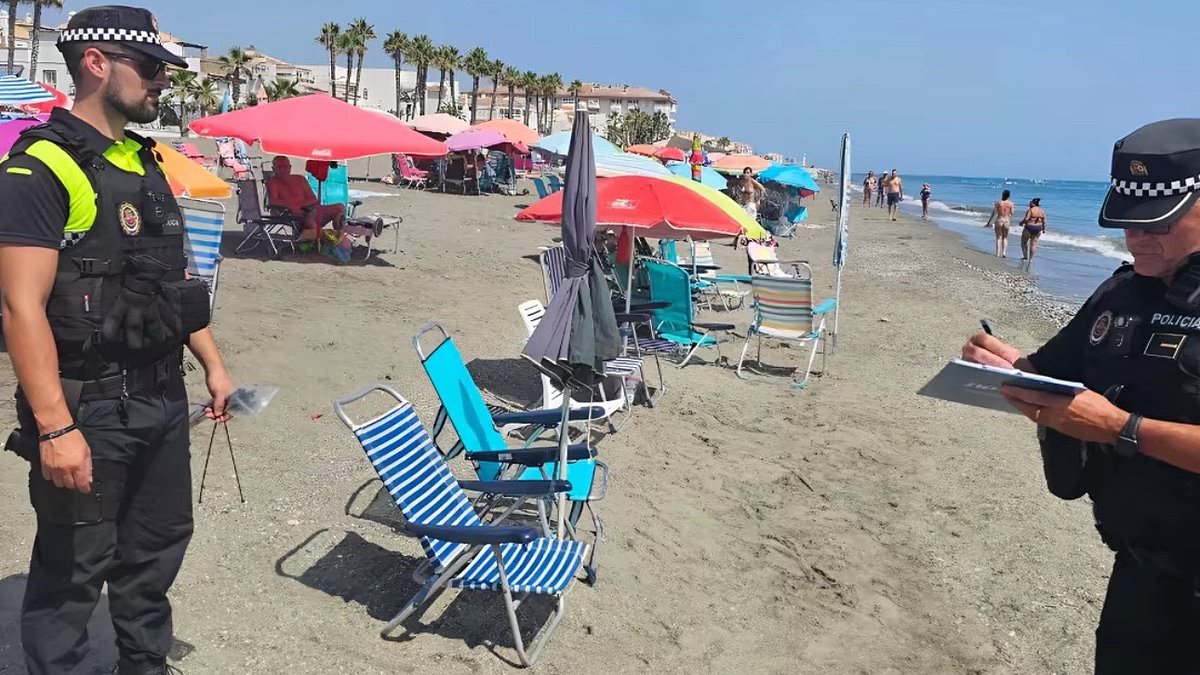Spanish police have joined the war on tourists by confiscating the loungers and umbrellas of selfish beach hoggers who set up shop then leave – sometimes before dawn.
Council chiefs at popular resorts on the Spanish mainland and in the Balearics and Canaries have introduced fines for sunseekers who abandon their belongings while they have lunch or even go back to bed.
The loungers and umbrellas are taken to the local police station and tourists must pay the equivalent of £210 to retrieve them.
The new rules are just the latest development in Spain’s war on tourists that has seen widespread protests and visitors even attacked with water guns this summer.
Protesters have also occupied beaches on the island of Majorca in an attempt to reclaim them for local people.
Local laws in coastal area now ban the setting out of chairs, sunbeds or umbrellas before 9am in an attempt to prevent them getting in the way of beach cleaning at the resorts.
Photos shared on social media show police in Malaga enforcing the rules with uniformed officers removing chairs from the beach.
Separate pictures show police cars piled high with the confiscated chairs and umbrellas.
The angry user captioned the post on TikTok ‘you can’t occupy a place on the beach while you go to have lunch but yes they can occupy your house’ – in a reference to Spain’s unpopular squatting laws.
Others however welcomed the new rules.
One Facebook page dedicated to Spanish tourism said: ‘Where are the people? We’ll tell you… sleeping or having breakfast at home.
‘This practice, which has been carried out for many years, is beginning to be regulated by coastal town councils, because it is not normal to arrive at 9 or 10 in the morning and find the first and second rows of beach full and no one around.
‘Only those who have suffered it understand the importance that town councils, through their local police, regulating the proper use of these spaces.’
Spanish media has reported that the rules prohibit the ‘indiscriminate occupation of public domain land and makes special reference to taking up beaches with elements such as chairs, deckchairs and parasols from the early hours of the morning.’
The local laws also state umbrellas, chairs or deckchairs left unattended for more than three hours can be removed.
If there is evidence the items have been left without the owner present, the town hall, through the local police or its cleaning staff, may remove them.
A Spanish news outlet reported: ‘For some years now, the council has been receiving numerous complaints every summer about spaces being reserved on the beaches, as when users arrive at the beach mid-morning they find much of the sand occupied by items belonging to people who are not there.
‘Items which have been removed are deposited at the local police station, from where owners have to pay €250 to recover them, in accordance with article 54 of the bylaw regulating the police, good governance and taxation of street trading.’
This summer thousands of protesters have descended on the streets of Spain to speak out against mass tourism in the country.
In July, thousands of protesters marched through Barcelona waving placards and squirting holidaymakers with water guns.
The protest was organised under the slogan ‘Enough! Let’s put limits on tourism’ to demand a new economic model that would reduce the millions of tourists that visit every year.
Protesters carried signs reading ‘Barcelona is not for sale,’ and, ‘Tourists go home,’ before some used water guns on tourists eating outdoors at restaurants in popular tourist hotspots.
Chants of ‘Tourists out of our neighbourhood’ rang out as some stopped in front of the entrances to hotels.
Barcelona’s rising cost of housing, up 68 percent in the past decade, is one of the main issues for the movement, along with the effects of tourism on local commerce and working conditions in the city of 1.6 million inhabitants.
Rents rose by 18 per cent in June from a year earlier in tourist cities such as Barcelona and Madrid, according to the property website Idealista.
Protests have also taken places on the beaches of Majorca this summer, calling on locals to reclaim the spaces.
This weekend anti-tourism protesters armed with banners and placards have stormed a popular party beach on the island.
Campaigners in Majorca have blamed visitor numbers for problems such as the rising cost of living and a lack of housing for locals.
One protester said: ’40 years ago, when I was young, I used to come here to swim, then people started coming to drink and it has deteriorated.’
Another added: ‘We are trying, for a moment, for a few hours, to remember that these sandbanks are the property of all Majorcans not just tourists, we can all enjoy them too.
‘Many tourists understand this, it is easy to understand that the rent has doubled, that everything is full.’
Last month anti-tourist campaigners in Majorca mocked England’s Euro 2024 final defeat against Spain and demanded Britain ‘takes back its drunks’.
Up to 50,000 locals descended onto the streets of the Majorcan capital Palma on July 21 as they called for curbs on the amount of foreign visitors allowed on the Spanish island.
Among them was one who held aloft a picture of England full-back Kyle Walker accompanied by the words: ‘The only thing coming home is you’.
